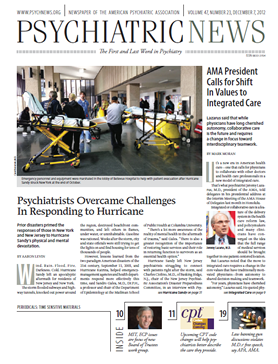Medications may help psychiatric patients get better, but “getting better” is a “profoundly value-laden term,” said Ronald Diamond, M.D., a professor of psychiatry in the School of Medicine and Public Health at the University of Wisconsin.
“ ’Better’ means different things to different people,” said Diamond at APA’s Institute on Psychiatric Services in New York in October.
“You and the patient might disagree not on what is happening but on its value,” he said. “It could be subjective improvement for the patient, better functioning, symptom improvement, reduced distress, or simply not getting worse.”
Medications are a tool for recovery and can make nonpharmacological treatments more effective, possibly by making the brain less sensitive to stimuli, he said.
“Medications are never a goal of treatment; rather, they can help patients reach their own goals,” he said. “Ambivalence about medications is normal, but people will take them if they feel they will help them and won’t if they don’t.”
All medications have potential risks as well as benefits, so side effects are best seen from the patient’s point of view.
“A ’minor sexual side effect’ is one that happens to someone else,” noted Diamond ironically.
How much weight gain is “tolerable?” One patient told him she’d rather be a sane fat lady than a crazy skinny one.
Find out what the patient hopes the medication will do, he urged. Try to agree on specific detailed outcomes based on observable behaviors. Some targets better reveal the effects of medications than others. For example, Diamond said, “Distress caused by hearing voices may change once the patient is on medication, even if the voices do not go away.”
Explore Reasons for Medication Failure
Often clinicians blame either patients or the medications when the latter “fail” to work, but that problem requires closer investigation, Diamond emphasized. “Medications do not work for everyone, and noncompliance rates are also high for drugs prescribed for other illnesses, like hypertension, diabetes, or asthma.”
The patient may not actually be taking the drug or hasn’t taken it long enough to work. The dose could be too high or too low. Patients could have a medical illness or be abusing drugs or alcohol. They may have unrealistic expectations about what medications can do. It is even possible that the diagnosis was wrong.
“Our job is not to convince patients to take medications, but to structure the flow of information to help them to make good decisions about their conditions and treatments,” he said. Work should be done collaboratively and, if necessary, with the support of family or others.
’Lose Gracefully and Educationally’
“We waste time trying to get patients to agree with our point of view of the world,” said Diamond. “If the patient wants to go off the medication and can’t be persuaded otherwise, lose gracefully and educationally.”
Education might include a discussion of the patient’s expectations for what will happen once the medications are stopped and also what he or she wants to do if the results do not meet expectations.
Such efforts don’t always work, he said, recalling one patient who stopped medications and never fully recovered even after a restart.
“The issue is not ’compliance’ or ’adherence’ but effectiveness,” he said.
“Helping” patients means not solely treating a diagnosis but helping them come to a resolution of a problem that is important for that person, when medication is seen as an important part of solving that problem, said Diamond.
“And if we and our patients really feel that our medication will seriously help them get their lives closer to what they really want them to be, then they’ll take it,” he said. “And if they don’t, none of this matters. We can write the best prescription in the world, at the lowest price in the world, with the best ACT teams in the world, and people will still go off their medications.”
Finally, the relationship between the patient and physician is crucial.
“We take medications from people that we like and we trust,” he said. “Ten percent of a medication assessment is looking for side effects, 10 percent is looking for efficacy, and the other 80 percent is working at relationship building.”
Hope is especially important, Diamond concluded. “Patients aren’t going to take anything if they feel hopeless,” he said. “We have to engender hope and keep it alive until patients feel they can get better.”


